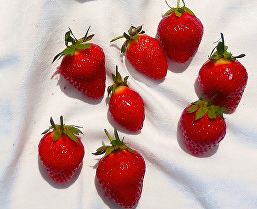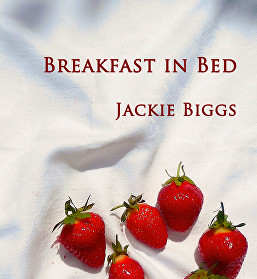Kathy Miles reviews Breakfast in Bed, the latest collection from Jackie Biggs from the award-winning press Indigo Dreams.

Over the last few years, the award-winning Indigo Dreams has become one of the fastest-growing poetry publishers, providing new and established writers alike with the opportunity to share their work with others. Fresh from the press is Breakfast in Bed, a second collection by Jackie Biggs; a nosegay of aromas, tastes and flavours that deals boldly and unashamedly with love in all its various aspects. This is a delicately nuanced book, where the poet is at different times both lover and loved, observer and participant. The juggling of these sometimes disparate points of view gives a constantly changing but elegiac quality to the poems, and an intimacy that draws the reader into a world where manifestations of love also embrace memory, anger, absence and occasionally violence.
Above all, it is a sensual book. The poet is an ever-present narrator, feeling the world through her senses, experiencing the landscape somatically as well as through the imagination. The first poem, “Alone and together“, sets the gentle tempo of the collection; the reader is invited, ‘for this hour adrift’, to set time on one side as the ‘river flows through / afternoon’s slow heat / Lorca’s pace’. Water is a constantly recurring theme. Just as we start with the easy flow of the river, the poet ends with the sea,
hair knotted with brine
sharpness of salt
soft touch of seaweed breeze(“Boundless”).
Water is a catalyst for love, and a medium for sharing, whether it is lovers swimming side by side, sleeping on the beach, ‘wrapped together / in the lee of rocks / by the glow of our fire’, (While the tide is with us) or a woman showing a child
flowing emerald sea palms
anemones waving rosy arms
dusky dark mussels clingingand asteroidea –
two starfish waiting
one for me one for you.(“All these small things”)
If water is a catalyst for love, food is the signifier for it. Strawberries, lemons, apple cake, ‘sour sharp of redcurrants / balanced with sweet apple / a tang of ginger’ (“We do not speak of love”). In “Territories” the poet remembers ‘tasty vapours from a pot on the stove…brisket or a hock of ham, fat and greasy’. But these signifiers also point to much darker sides of love. If the lover in “We do not speak of love” is revered for ‘the cakes you make / with sweetness of walnuts and dates / spice notes of oaty parkin’, the baking of a perfect tart in the ironically titled Just dessert is brilliantly undercut by the image of the apples’ ‘deep bloody skin’, the ‘acid heart’ of the dessert, and at the end, the ‘double-edged blade / of her silver knife’. And in the startlingly visceral “Cleopatra tells Antony how it really is”, we see Cleopatra bending over the dying Antony on the battlefield, where she declares
As I suck out your rancid guts
and spill them all over myself
you know, you know, there will never be a treaty.
Among the sensual and erotic are poems of hurt or loss; a woman grieving a baby, wondering each year what her daughter might have be doing as she grew (“Would I have cried?”); memories of a lost partner or parents. And a moving tribute to Jo Cox, in which the poet eats strawberries for breakfast ‘because they were fat / and red / and ready with the sweetness of joy’ as she tries to comprehend the enormity of the news (“After the killing”).
The poet’s father is remembered in Oilman, a vivid portrait of the ‘car doctor’ as he mended engines, fixed a carburettor, oil the ‘driving force in his veins’:
He had it all for us:
ignition, timing,
he was our shock absorber,
our brake,
our strength.
The oil in all our works.
Restoration comes through physical interaction with the landscape; swimming, walking, collecting wood for a fire, planting the garden with thyme and lavender, orange and yellow poppies
for sleep, peacefulness
and for remembering.(“Growing on”)
And, with current love, that edge of uncertainty, a feeling of the fragility of things; the poet texting her lover in After the killing, ‘just to make sure / that you were there’, the water washing away their traces ‘as if we were never here’ (“While the tide is with us”).
This is an accomplished and enjoyable collection. Biggs has the journalist’s knack of cutting to the chase, of catching the moment succinctly in a few words. The heart of the collection can be summarised by the closing lines of “After the killing”:
So I wrote new poetry
above love
because that is all there isand I thought of life
this life
how we all
have to keep breathing
over our own endless sands
breakfast in bed
The poetry collection, Breakfast in Bed by Jackie Biggs is out now.
Kathy Miles has written a few contributors for Wales Arts Review.











